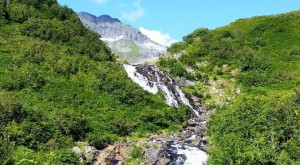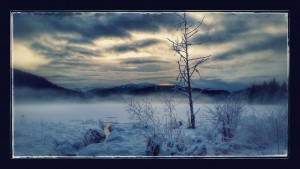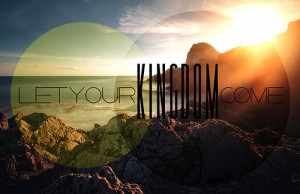The Unfinished Symphony by David Levin
It is winter in Alaska, and for a weather geek like myself, it's one of the most exciting times of the year. It seems like there is always something interesting brewing out over the vast expanse of the Pacific Ocean to our west. For those of you that aren't familiar with the geography and climate of Juneau, I will fill you in.
Juneau lies on the SE panhandle of Alaska and is along the west coast of continental North America. It is bounded on the east by the Coast Range, a chain of mountains running north to south along the Alaskan Panhandle and western British Columbia. To the west are several mountainous islands and various saltwater channels eventually leading out into the Gulf of Alaska. Due to it's proximity to the ocean and it's location on the west slopes of the Coast Range, Juneau is usually in the cross hairs for many of the storms which develop in the North Pacific and track eastward. These systems tend to track into the eastern Gulf of Alaska and then stall out and slowly die, having trouble passing over the higher mountain ranges to the east. The result is long periods of clouds and precipitation. In the winter, Juneau is also a battleground between cold air which tries to spill over and through mountain passes and channels from the Yukon, and relatively mild air from the west and south originating from the Pacific. Snow can pile up quickly, but can also change to rain and wash away as fast as it came, leaving no trace of the winter wonderland behind, replacing it with piles of slush. [read more="Read more" less="Read less"]
It is also a place of great physical beauty. Wonder is everywhere. There are mountains, fjords, and glaciers. On clear nights you can see the Auroras to the north. There are so many stars. It is not uncommon to sit on a beach, with snow capped mountains in the background watching whales spout in the distance, or colonies of sea lions frolicking by the shore. People travel from all over the world here in the summer just to be close to the beauty. Even those of us that live here will do some pretty crazy things just to experience the grandeur and the majesty of this place. It is really indescribable and even after living here for several months, I still have to remind myself that I am not on vacation.
It's like all of nature is in a sort of dance. It is happening all over the world. I think it's just more noticeable in places like SE Alaska. Everything is moving in rhythm, teeming with life up here. Maybe a better way to describe it is that it's more like a song. From the atmosphere to wildlife, even in the length of the days, everything has a beat, or a harmony if you will. The atmosphere provides rain for the plants and animals. The plants provide oxygen for the atmosphere. The mountains and glaciers act to store water for the lowlands below. If you think about it closely, everything is in orbit in some sense.
To expand things out, take even our solar system with the planets moving in step together around the sun. Then we broaden our view and find that even our sun is moving in orbit as a part of our galaxy. Taking an extremely wide angle look (and here is where I will stop because I am certainly not an astrophysicist and am not even going to pretend that I know how galaxies work) high powered telescopes have enabled us to see that there are countless galaxies even bigger than our own. We could even take it down to the micro scale and look at something as simple as an atom. Even here we find orbits, minute electrons in a dance with the protons and neutrons at the center.
Why are we attracted to these things? Why do I find myself almost in tears at the beauty of this place? Why do certain songs move me, certain harmonies stir something inside me? And yet, I find even when I get to the mountain peak, set foot on a glacier for the first time, or finish listening to that beautiful melody that there is still a sense of something missing. It's almost depressing. It's like I want to join in the harmony, to become a part of it, to lose myself in it. I can get close. Really close. But at the end of the hike or at the final note of the song, I'm still an outsider. Everything else is a part of the dance, but I am standing still.

C. S. Lewis says it this way in his book "The Weight of Glory"
We do not just want merely to see beauty, though, God knows, even that is bounty enough. We want something else which can hardly be put into words--to be united with the beauty we see, to pass into it, to become part of it...That is why the poets tell us such lovely falsehoods. They talk as if the west wind could really sweep into a human soul; but it can't. They tell us that 'beauty born of murmuring sound' will pass into human face; but it won't. Or not yet...
At present we are on the outside of the world, the wrong side of the door. We discern the freshness and purity of morning, but they do not make us fresh and pure. We cannot mingle with the splendors we see.
So what is this dance of nature? What is this mysterious harmony (although imperfect now) for which I long? And why can I not get into it?
That story is a long one. The longest one in the world. It dates back to time beyond time. The story was going on eons ago, before our world even began. It is a story of love and tragedy, but also of hope restored.
Once again I ask you to just play along with my thoughts for a moment. Even if you disagree with me. It's fun to imagine right?
If you grew up in the Bible belt like I did, then you either sang the songs or at least heard the Sunday school lesson (who thought of the name "Sunday school" anyways...I mean we go to school Monday through Friday...wouldn't we want Sunday off? Obviously whoever thought this up was not a fan of fun!) about "God is love". You would have heard it over and over again. The same stories, the same songs. Then if you're like me, it became rote memorization. Then it became disillusionment when you figured out how bad the world really was...or how bad I was. How can God be love? To me this is all well and good and it makes for a cute Sunday school lesson until I thought about the implications of what it truly means and how it might explain many of my longings and desires. So let's examine these claims a bit more closely.
We are taught that God is a personal God and that he is love. So who does he love? And how do we fit into the story?
Let's assume for a moment that there is a God and that he has always existed. Tough stretch of the mind for myself...because my mind is trapped by the concept of time. But when I think a bit deeper, it makes sense that even time itself had to have come into existence at some point. Therefore it's logical to think that there is something (or someone) outside of time which was responsible for time. But I digress. Let's also assume that God has always existed in three persons, something else I was taught. This is called the doctrine of the Trinity and I'm not sure I understand it well enough to explain anything about it. Let's suffice it to say that it would be a bit like a two dimensional stick figure trying to explain the concept of a cube to another two dimensional stick figure. Perhaps that's not the best illustration but it's the best I can do when I'm running short on coffee! The point is that God existing in three persons is tremendously important for the concept of God being love. For it means that love too has always existed. God was not lonely. There was perfect love, perfect adoration, perfect community from infinite time past. The three persons as one in perfect union in perfect love...together forever. Once again C. S. Lewis describes this better than I can:
All sorts of people are fond of repeating the Christian statement that 'God is love'. But they seem not to notice that the words 'God is love' have no real meaning unless God contains at least two Persons. Love is something that one person has for another person. If God was a single person, then before the world was made, He was not love. Of course, what these people mean when they say that God is love is often something quite different: they really mean 'Love is God'. They really mean that our feelings of love, however and wherever they arise, and whatever results they produce, are to be treated with great respect. Perhaps they are: but that is something quite different from what Christians mean by the statement 'God is love'. They believe that the living, dynamic activity of love has been going on in God forever and has created everything else. And that, by the way, is perhaps the most important difference between Christianity and all other religions: that God is not a static thing--but a dynamic, pulsating activity, a life, almost a kind of drama. Almost, if you will not think me irreverent, a kind of dance.
Here is where we come to our part in the story. Even though there was no loneliness, only perfect harmony and community, for some strange reason, God decided to expand the circle.




